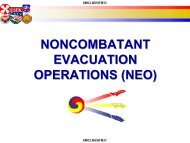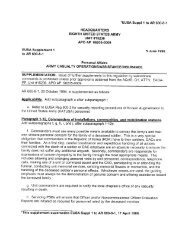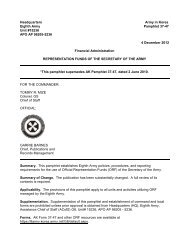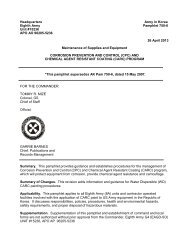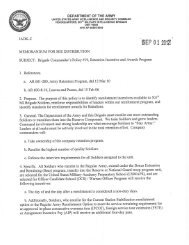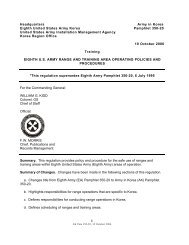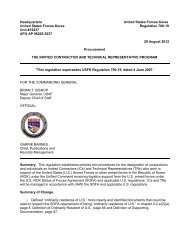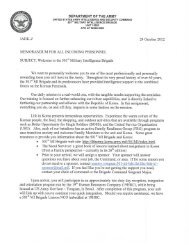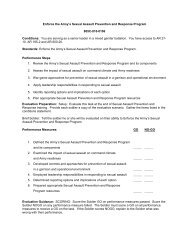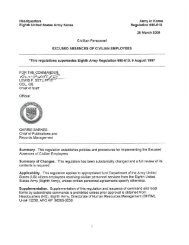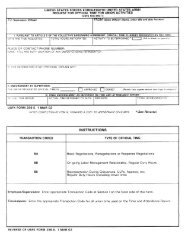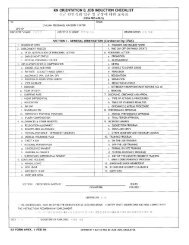CAS3 Staff Officer Guide - U.S. Army
CAS3 Staff Officer Guide - U.S. Army
CAS3 Staff Officer Guide - U.S. Army
You also want an ePaper? Increase the reach of your titles
YUMPU automatically turns print PDFs into web optimized ePapers that Google loves.
© 2005 <strong>CAS3</strong> For Instructional Purposes Only<br />
Compiled by www.<strong>Army</strong>Toolbag.com<br />
<strong>Staff</strong> <strong>Officer</strong> <strong>Guide</strong>lines 6<br />
m. Always follow through. A staff plan or action is not complete until you have assessed the<br />
results of its execution. The staff officer is responsible for tracking an action until the desired results<br />
are obtained. An action passed IS NOT an action completed.<br />
n. Get things done by not waiting to be told what to do. Actively seek areas that need attention.<br />
<strong>Staff</strong> Leadership<br />
a. Develop your subordinates. Remember--your subordinates will have your job someday.<br />
They will only be as good at the job as you make them today. Productively employ everyone to gain<br />
your section’s full capability. Underwrite your subordinates’ mistakes; give them the opportunity to<br />
grow by delegating tasks to them as you coach and train them. Program time for both you and your<br />
subordinates to develop professionally. Counsel and mentor your subordinates frequently.<br />
b. Train your section’s soldiers. Remember--some are working off the “front line” of their<br />
primary MOS. <strong>Staff</strong> section SGMs are responsible for the enlisted soldiers, while staff principals are<br />
responsible for the officers. Establish training management within the section per FM 25-100 and<br />
FM 25-101.<br />
c. Tell your subordinates when they have done a job well. Use the award system. Start<br />
reenlisting your good soldiers on their first day. Take care of your civilian employees as you would<br />
your soldiers.<br />
d. Check the maintenance of your equipment often to keep your equipment in top condition.<br />
Take an active role in accounting for your section’s property. Schedule time for your people to<br />
maintain your equipment.<br />
Time Management<br />
a. Learn to analyze and solve tomorrow’s problems instead of reacting to yesterday’s problems.<br />
Time spent solving yesterday’s problems is wasted. Know the division’s long-range planning<br />
calendar as it impacts your staff area of responsibility. A good staff officer anticipates requirements.<br />
b. Plan your schedule so you have time to reflect and to be creative.<br />
c. Understand the requirement before you begin. If you are not sure, return for additional<br />
guidance. To work on the wrong problem is a waste of valuable time.<br />
d. Work smarter, not harder. Harness technology; however, do not allow information<br />
technology to be a chokepoint to your work. A computer should be the means to the end, not the end<br />
itself.<br />
e. An “OK” staff product that is timely is far better than an “excellent” product that is<br />
completed at the last minute or that is late; however, the “OK” mentality is not a license to do<br />
marginal work when time is available to produce a better product.<br />
f. Organize your work. Most staff officers have more work to do than time allows. Develop a<br />
priority and tracking list. Work on the most important action first; provide interim responses on the<br />
other actions. When you begin and close each day, take stock of where you are headed.



